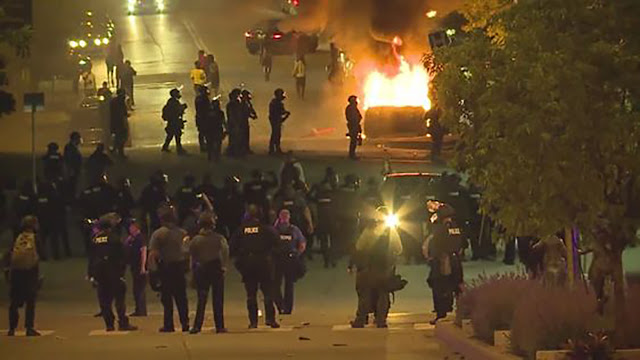Crossing a deadly line
Like many metro areas in the United States over the recent weekend, mine saw day after day of large, mostly peaceful crowds demonstrating in the streets. The protesters came out to decry the actions of four Minneapolis police officers who slowly (it took almost nine minutes), publicly, murdered a man in the street by kneeling on his neck and back.
 |
| Nareen Stokes, mother of Ryan Stokes, a local man killed by police, speaks to the then-peaceful crowd in Mill Creek Park near the Kansas City Country Club Plaza. (Photo by Carlos Moreno. Many thanks to KCUR Kansas City). |
That's a deadly example of "crossing the line" that should never, ever be condoned. But that kind of "crossing the line"--extra-rough treatment of people from certain neighborhoods, with a certain skin color--by police happens all too often.
Is there a systemic racism problem, or is it just a whole lot of unfortunate, isolated incidents? How you answer that question probably depends on your background, experiences and race. There's even disagreement among police. Black officers see more of a problem than white officers, in recent polling.
Certainly, the officers in the George Floyd case crossed a line, although getting charges and convictions will be difficult. This wasn't the first time Officer Derek Chauvin, the neck-kneeler, got in trouble for mistreating citizens, although one hopes it is the last.
Why do police officers cross those ethical lines?
Anyone who has followed my blog for any length of time knows I'm not a hater of the police. I'm concerned about their well-being, inspired by their service, and generally convinced that we'd be in a world of hurt without them. I write novels about (mostly) admirable law enforcement officers, and I do my level best to extrapolate realistically into my futuristic world.
But people are people. While most applicants go into law enforcement with good motives, no profession is populated solely by angels. And although many seek an exciting career, police work may be more than they bargained for. The job gives officers a front-row seat on more trauma and ugliness than most civilians would see in several dozen lifetimes.
 |
| A poster available on Amazon lists danger signs of officer stress, and management cues. (image courtesy of Police Posters on Amazon). |
Wounded, traumatized people can grow callous or violent. A persistent old-school police culture further tends to ignore the advice of psychologists about dealing with stress. Instead, there's pressure to "suck it up" and get on with the job. To self-medicate for depression or stress with alcohol or other substances. Nobody does their best work while drugged.
Crossing other lines
Unfortunately, I need to get back to those protests I mentioned at the beginning of this piece. Because although during the day most protesters peacefully exercised their First Amendment rights, things changed at night.
Night after night, rioters have vandalized, looted, and burned businesses and cars. It happened here in Kansas City, and in many other cities, too. One shocking casualty that hit the science fiction community extra-hard was the loss of the legendary Uncle Hugo's Science Fiction Bookstore in Minneapolis.
It's as if the transition from day to night turned people mean. In part, it seemed to become a self-fulfilling cycle. Authorities imposed curfews, in an effort to prevent violence. Police attempted to disperse crowds, in many cases using tear gas or pepper spray. Angry protesters fought back, and all hell broke loose.
 |
| After dark, the protests turned uglier. A Kansas City PD vehicle burns on Saturday night, May 30, 2020. (Many thanks to Fox 4 News for this photo). |
I think a lot of us would echo Terrence Floyd's plea, "Let's do this another way," besides destruction. Yet it is important to pay attention to the roots of the contemporary violence. If "riots are the language of the unheard," we all owe it to ourselves to listen. And also to pay enough attention to discern between angry, fed-up people and calculating opportunists.
A better kind of line-crossing
But I'd like to close this post on a brighter note. For all the anger on display, for all the ugliness after nightfall, and for all the brutality being protested, there were moments of positive "line-crossing." Of police officers taking a knee, joining a march, and reaching across barricades. And there were more of them than I recall having seen in past rounds of protests.
They, too, were mostly appalled at the way George Floyd died. Police forces in most of our cities are engaged in a long, slow effort to reform relations with their communities of color. There are a lot of fences to mend. A lot of history to overcome. That's why people are in the streets--again. Too many times, police officers have crossed that line in the wrong ways.
 |
| Possible signs of change in Kansas City? At left two Kansas City PD officers hold up a sign that reads, "End police brutality!" At right KCPD Chief Rick Smith and Kansas City Mayor Quinton Lucas kneel for a moment of silence for George Floyd, while holding up an "I can't breathe" T-shirt. (Photos courtesy of Forbes, via Twitter and Katie Moore/Kansas City Star). |
That needs to change. Our communities are calling for it. Police departments surely know it can't continue this way, and some places appear to be doing better.
Let's nurture that change. Let's find ways to encourage and reinforce it. It's time for crossing the line of division, and reaching out toward healing.
IMAGE CREDITS
Many thanks to KCUR Kansas City and photographer Carlos Moreno, for the photo from Nareen Stokes's speech. Police stress poster image courtesy of Police Posters on Amazon. Many thanks to Fox 4 News for the photo from Saturday night. Photos of connections between police and community are courtesy of Forbes, via Twitter and Katie Moore/Kansas City Star. I appreciate all of you!
No comments:
Post a Comment